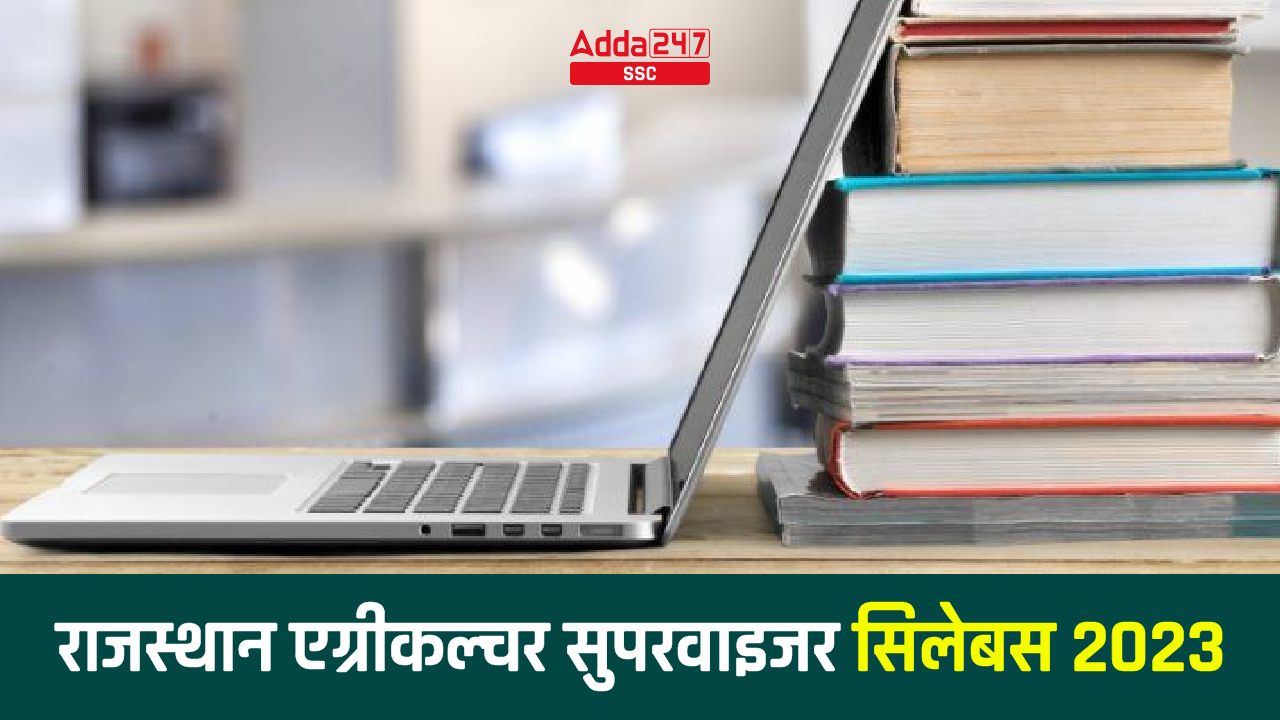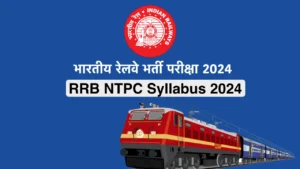राजस्थान एग्रीकल्चर सुपरवाइजर सिलेबस 2023
राजस्थान एग्रीकल्चर सुपरवाइजर सिलेबस 2023: राजस्थान अधीनस्थ एवं मंत्रिस्तरीय सेवा चयन बोर्ड (RSMSSB) इस साल 21 अक्टूबर को कृषि पर्यवेक्षक पद के लिए भर्ती परीक्षा आयोजित करने जा रहा है। परीक्षा की तैयारी करने वाले व्यक्तियों की आसानी के लिए, SSCADDA इस लेख में विस्तृत अनुभाग-वार राजस्थान कृषि पर्यवेक्षक पाठ्यक्रम 2023 प्रदान कर रहा है। राजस्थान कृषि पर्यवेक्षक पाठ्यक्रम 2023 को समझने से आपको बेहतर तैयारी करने में मदद मिलती है, जिससे परीक्षा में आपकी सफलता की संभावना बढ़ जाती है। राजस्थान कृषि पर्यवेक्षक पाठ्यक्रम 2023 की समीक्षा करें और अपनी तैयारी शुरू करें।
राजस्थान एग्रीकल्चर सुपरवाइजर सिलेबस 2023: अवलोकन
यहां राजस्थान एग्रीकल्चर सुपरवाइजर सिलेबस 2023 के लिए एक अवलोकन तालिका है।
| परीक्षा का नाम | राजस्थान कृषि पर्यवेक्षक (Agriculture Supervisor) 2023 |
|---|---|
| परीक्षा आयोजक | आरएसएमएसएसबी (राजस्थान अधीनस्थ और मंत्रालयिक सेवा चयन बोर्ड) |
| आधिकारिक वेबसाइट | https://rsmssb.rajasthan.gov.in |
| परीक्षा का प्रकार | राज्य स्तरीय परीक्षा |
| आलेख का प्रकार | पाठ्यक्रम |
| अनुमानित परीक्षा तिथि | 21 अक्टूबर 2023 |
| आवेदन का तरीका | ऑनलाइन |
| योग्यता | कृषि या बी.एससी. (कृषि) में 10+2 (इंटरमीडिएट) या भारत के किसी भी मान्यता प्राप्त विश्वविद्यालय से |
| परीक्षा अवधि | 120 मिनट (2 घंटे) |
राजस्थान कृषि पर्यवेक्षक परीक्षा पैटर्न
- राजस्थान कृषि पर्यवेक्षक परीक्षा पैटर्न
- प्रत्येक प्रश्न 3 अंक का है।
- प्रत्येक गलत उत्तर के लिए 01 अंक की नकारात्मक अंकन है।
- प्रश्नों की कुल संख्या: 100
- कुल समय अवधि: 2 घंटे
S.No. Subject No. of Questions Maximum Marks 1 General Hindi 15 45 2 General Knowledge Rajasthan, History and Culture 25 75 3. Agronomy 20 60 4 Horticulture 20 60 5 Animal Husbandry 20 60 Total 100 300 राजस्थान कृषि पर्यवेक्षक पाठ्यक्रम: विषयवार
सटीक और संक्षिप्त जानकारी के लिए उम्मीदवार इस पाठ्यक्रम को प्राथमिकता दे सकते हैं। राजस्थान कृषि पर्यवेक्षक पाठ्यक्रम 2023 में सामान्य हिंदी, सामान्य ज्ञान (राजस्थान इतिहास, संस्कृति), पाक विज्ञान, पशुपालन और बागवानी शामिल हैं।
- General Hindi
- संधि – विच्छेद ,उपसर्ग और प्रत्यय,पद विग्रह,
- शब्दों का अर्थ भेद,पर्यावाची,विलोम, शब्दशब्दों और वाक्यों का सुधिकरण,
- वाक्यांश के लिए एक शब्द,मुहावरे,लोकोक्तियाँ,
- सवर्नाम,विशेषण,व्याकरण।
2. General Knowledge ( Rajasthan History, Culture)
- Geographical Structure of Rajasthan Geographical division, climate, major mountains, rivers, deserts, and crops.
- History of Rajasthan Civilizations Kalibanga and Ahad Major personalities – Maharana Kumbha, Maharana Sanga, Maharana Pratap Rao Jodha, Rao Maldev Maharaja Jaswant Singh, Veer Durgadas, Maharaja Man Singh I of Jaipur, Sawai Jai Singh, Maharaja Ganga Singh of Bikaner, etc. Prominent litterateurs, folk artists, musicians, singers, sportspersons, etc. of Rajasthan.
- Contribution of Rajasthan to the Indian freedom struggle and integration of Rajasthan.
- Rajasthani vocabulary of various Rajasthani dialects, agriculture, and animal husbandry activities.
- Agricultural, Animal Husbandry, and Professional Terminology.
- Lok deities, main saints, and sects.
- Major folk festivals, festival fairs, and animal fairs.
- Rajasthani folk tales, folk songs and dances, idioms, sayings phad, folk drama, folk instruments, and puppet arts.
- Different castes, tribes.
- Garments and ornaments of men and women.
- Painting and Handicrafts Different styles of painting, mural painting, stone craft, wood art, pottery (clay) art, Usta art, hand tools, woven rugs, etc.
3. Agronomy
- General knowledge of Rajasthan’s geographical location, agriculture, and agriculture statistics. Scenario and importance of agriculture, horticulture, and livestock in the state. Main constraints in agriculture and horticulture production of Rajasthan. Climatic zones of Rajasthan, soil fertility and productivity, alkaline and usar lands, acidic lands, and their management.
- Types of soils in Rajasthan, soil erosion, methods of water and soil conservation, essential nutrients for plants, availability, and sources, terminology of traditional agricultural activities in Rajasthani language, the importance of organic fertilizers, types and methods of preparation and nitrogen, phosphorus, Potassium fertilizers, single, compound and compound fertilizers and methods of their use, the importance of irrigation in crop production, sources of irrigation, water demand of crops and factors affecting them.
- Time and quantity of drainage and its importance, methods of drainage. Terminology related to conventional irrigation with reference to Rajasthan, Soil testing, and improvement of problematic soils. Size, hay-making, fodder conservation.
- Weed characteristics, classification, damage caused by weeds, methods of weed control, weed control with weedicide chemicals in main crops of Rajasthan, and the vocabulary of weeds in Rajasthani language.
- Information about climate, soil, field preparation, variety, seed treatment, seed rate, sowing time, fertilizer, irrigation, intercrop, plant protection, harvesting, storage, and crop cycle for the following main crops: Cereal crops Maize, Jowar, Bajra, paddy, wheat and gram, lentils, moong, Chawla, lentils, urad, moth, gram and peas.
- Oilseed crops Groundnut, Sesame, Soybean, Mustard, Linseed Castor, Sunflower, and Taramira Fiber crops.
- Fodder crops Berseem, Rizka, and Oats. – Spice crops fennel, fenugreek, cumin, and coriander. Cash crops wise and sugarcane.
- Qualities of good seed, seed germination and factors affecting it, seed classification, basic nucleus seed, breeder seed, foundation seed, certified seed, the importance of dry farming, technology of dry farming, mixed cropping, its types, and importance. In the context of the importance and principles of the crop cycle, information about important schemes of the agriculture department, storage of grains and seeds.
4. Horticulture
- Importance of horticulture fruits and vegetables, present status and future, nursery management of fruit plants, plant propagation, selection and planning of the place of a plantation, various drawing methods of planting gardens, adverse weather conditions like frost, heat wave and flan and their solutions.
- Use of various plant growth regulators in orchards, methods of vegetable production, and nursery management in vegetable production.
- Information about the following horticulture crops including climate, soil, improved varieties, propagation methods, organic manure and fertilizers, irrigation, harvesting, yield major pests and diseases and their control in Rajasthan, Mango, Citrus, Guava, Pomegranate, Papaya, Plum, Dates, Amla, Grapes, Garlic, Beet, Tomato, Onion, Cauliflower, Cabbage, Okra, Pumpkin class vegetables, Brinjal, Chilli, Garlic, Pea, Carrot, Radish, Spinach.
- Importance of fruit and vegetable preservation, present status and future principles and methods of preservation canning, Technique of drying and dehydration, and their traditional methods in Rajasthan. Methods of making Phalpak (Jam), Avleh (Jelly), Candy, Sharbat, Panak (Squash), etc.
- General knowledge of the cultivation of medicinal plants and flowers in the context of Rajasthan Important schemes of the Horticulture Department in the context of Rajasthan.
5. Animal Husbandry
- Importance of animal husbandry in agriculture Importance and management of livestock in milk production Characteristics, utility, and general knowledge of the place of origin of the following livestock breeds:-
- Cow – Gir, Tharparkar, Nagauri Rathi, Jersey, Holstein Friesian, Bhaldi, Haryana Mewati.
- Buffalo- Murra, Surti, Blue Ravi Bhadavari Jafarwadi, Mehsana.
- Goat – Jamnapari, Barbary, Beetle, Toggenburg,
- Camel- management, age calculation of animals.
- Bhed- Marwadi, Chokla Malpura, Marino Karakul, Jaisalmeri, Avivastra.
- Types of common animal medicines, uses, quantity, and method of giving medicines.
- Antibacterial phenyl, carbolic acid, potassium permanganate (reddish), laxative lysol, Magnesium sulfate (Macsulf), castor oil, Stimulating alcohol, Camphor Anthelmintic – Blue Throat, Finovis, Mardan oil – turpentine oil.
- Factors, symptoms, and treatment of major diseases of cattle of Rajasthan: foot-and-mouth disease, anthrax, galoots, Dhanela disease, milk fever, Ranikhet, chicken pox, bloody dysentery of chickens. animal plague,
- Milk production, milk and curd composition, clean milk production, milk preservation, milk testing, and quality.
- Determination of fat in milk, relative density, acidity, and method of cream separation and requirement of equipment and method of making curd, paneer, and ghee, cleaning and sterilizing utensils of dairy.
- Vocabulary related to animal husbandry practices and activities with reference to Rajasthan.



 RRB NTPC सिलेबस 2024: डाउनलोड करें CBT 1...
RRB NTPC सिलेबस 2024: डाउनलोड करें CBT 1...
 SSC JHT सिलेबस 2024, विषयवार पेपर 1 और 2...
SSC JHT सिलेबस 2024, विषयवार पेपर 1 और 2...
 SSC सिलेक्शन पोस्ट सिलेबस 2025: यहाँ देख...
SSC सिलेक्शन पोस्ट सिलेबस 2025: यहाँ देख...



